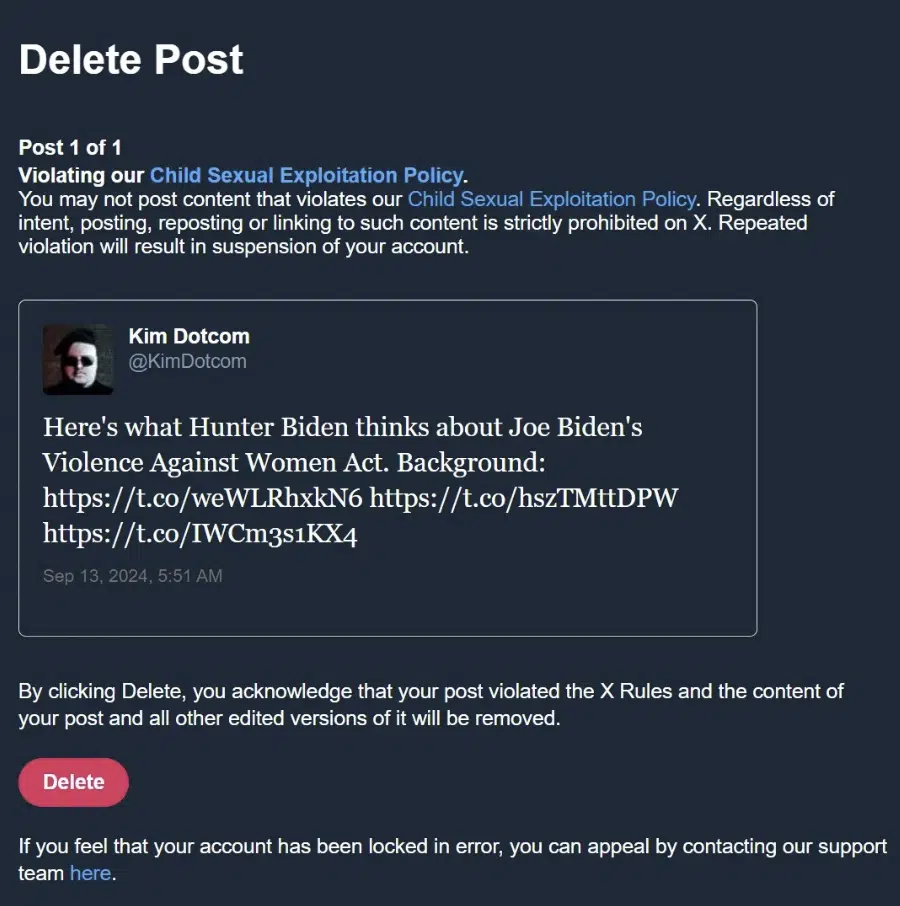
Kim Dotcom’s Fights Extradition Amid Conspiracy Theories and X Account Suspension
- Kim Dotcom returned to social media after a three-week break, saying X suspended his account.
- After regaining access, Dotcom reposted the published image that got him suspended in the first place.
- The picture was reportedly part of a haul from the alleged Hunter Biden laptop of the 2020 controversy.
Kim Dotcom disappeared for three weeks after his last post in mid-September and recently returned, saying X had suspended his account due to an extremely serious allegation. Dotcom warned that a Trump loss would see Musk indicted and "fighting for his life" and accused Elon Musk of failing to help.
Apparently, his account was suspended due to an X post stirring up the controversy surrounding the alleged contents of Hunter Biden’s laptop, which contained an alleged image from the haul.
In a dramatic turn in Kim Dotcom's ongoing legal saga, New Zealand has authorized his immediate arrest and extradition to the United States in August, prompting a flurry of conspiracy theories and public debate.
New Zealand Justice Minister Paul Goldsmith authorized Dotcom’s extradition to face charges relating to his former file-sharing website, Megaupload. Despite the legal pressure, Dotcom has maintained his stance on social media, declaring his intention to remain in New Zealand and rallying support through a series of provocative statements.
The announcement has further polarized public opinion, with a recent survey showing 46% of New Zealanders supporting his extradition, while 23% oppose it, and 31% remain unsure.
The case has sparked significant debate, particularly around New Zealand's perceived compliance with U.S. demands, stirring concerns about national sovereignty and the implications of extraditing a resident who has never set foot on American soil.
Dotcom has a plan to avoid extradition and said he does not want to leave New Zealand.
On social platforms like Reddit, discussions reveal a broad spectrum of opinions, reflecting Dotcom's divisive reputation. Critics point to the unprecedented scale of government resources used against him, describing the situation as a "dangerous precedent" that underscores international power dynamics.
Kim Dotcom, also known as Kim Schmitz, is a German-Finnish entrepreneur and political activist. He rose to fame in the early 2000s as the founder of Megaupload, a file-sharing website that allowed users to upload and share large files. At its peak, Megaupload had over 50 million daily visitors and accounted for approximately four percent of all internet traffic.
In 2012, Dotcom and three of his associates were arrested by New Zealand authorities at the request of the United States government for charges related to copyright infringement, money laundering, and racketeering. The U.S. government alleges that Megaupload's business model encouraged and profited from the illegal distribution of copyrighted material, costing copyright holders over $500 million in lost revenue.
Since then, Dotcom has been embroiled in a highly publicized legal battle to prevent his extradition to the U.S. He has consistently denied any wrongdoing and maintains that Megaupload was simply a file-sharing platform that complied with the law. In 2017, a New Zealand court ruled that he could be extradited to the US, but Dotcom appealed the decision.
In 2020, the Supreme Court of New Zealand ruled that Kim Dotcom and his colleagues could be extradited to the U.S. but that he could challenge the decision through judicial review. Megaupload defendants Mathias Ortmann and Bram van der Kolk eventually opted for a deal, pleading guilty, and served 30 months and 31 months prison sentences, respectively, in New Zealand.









